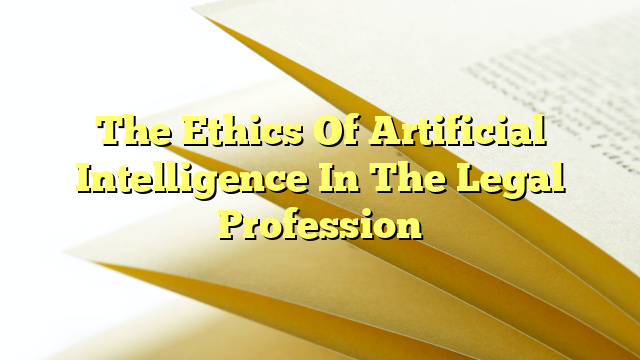- Introduction
- Types of Artificial Intelligence
- Potential Benefits Of AI In The Legal Profession
- Ethical Concerns of AI In The Legal Profession
- Conclusion
Introduction
Artificial intelligence (AI) is the use of technology to develop intelligent machines that are able to think, learn, and act autonomously. AI is rapidly evolving and has already been integrated into many industries, including the legal profession. AI can be used to automate legal processes, create predictive models, and provide support to attorneys and other legal professionals. However, despite the potential benefits of AI in the legal profession, there are ethical concerns that need to be considered.
Types of Artificial Intelligence
AI can be divided into two main categories: narrow AI and general AI. Narrow AI is a type of AI that is specifically designed to perform a single task, such as playing a game or analyzing data. On the other hand, general AI is a type of AI that is capable of performing multiple tasks and is able to learn and adapt to new situations. AI can also be divided into supervised and unsupervised learning. Supervised learning involves using labeled data to train an AI system, while unsupervised learning involves using unlabeled data to train an AI system.
Potential Benefits Of AI In The Legal Profession
The use of AI in the legal profession can provide numerous benefits, including improved efficiency and accuracy. AI can be used to automate legal processes, such as contract review and document management. This can help reduce the time and cost required to complete tasks, as well as reduce the risk of errors. AI can also be used to create predictive models that can help attorneys better understand and predict legal outcomes. In addition, AI can be used to provide support to attorneys by assisting with research and providing legal advice.
Ethical Concerns of AI In The Legal Profession
The use of AI in the legal profession raises ethical concerns, such as data privacy and bias. AI systems use large amounts of data to make decisions and the data used to train AI systems can be biased. This can lead to decisions that are not necessarily accurate or fair. In addition, data privacy is a concern as AI systems can access large amounts of data that may be sensitive or confidential.
The 5 Ethics in Artificial Intelligence
The ethical concerns of AI in the legal profession can be addressed through the following five ethical principles:
- Accountability: AI systems should be designed and operated in a manner that is accountable to those who use and rely on them. This means that AI systems should be able to provide explanations for their decisions and actions.
- Data Privacy: Data privacy should be a priority when designing and operating AI systems. Sensitive and confidential data should be protected to ensure that it is not misused or mishandled.
- Transparency: AI systems should be designed and operated in a transparent manner. This means that users should be able to understand how the AI system works and why it makes certain decisions.
- Fairness: AI systems should be designed and operated in a manner that is fair and equitable to all users. This means that AI systems should not discriminate against certain users and should make decisions that are unbiased and equitable.
- Responsibility: AI systems should be designed and operated in a responsible manner. This means that AI systems should be operated with the safety and well-being of users in mind.
Conclusion
AI has the potential to revolutionize the legal profession by increasing efficiency and accuracy, providing support to attorneys, and creating predictive models. However, there are ethical concerns that need to be addressed in order to ensure that AI systems are designed and operated in a manner that is accountable, transparent, and fair. The five ethical principles discussed above are a good starting point for addressing the ethical concerns

